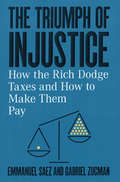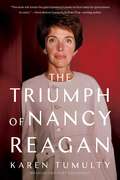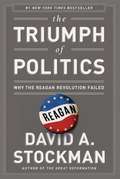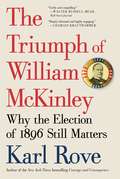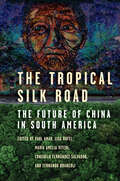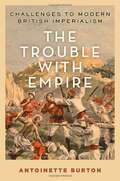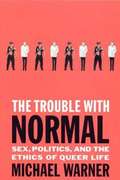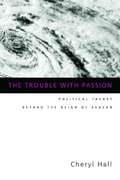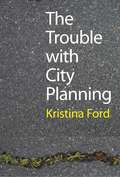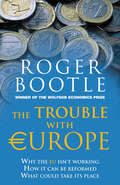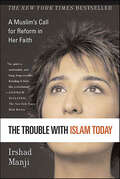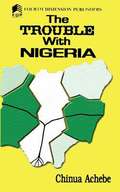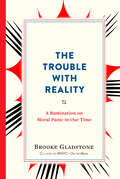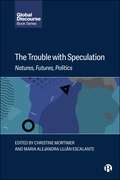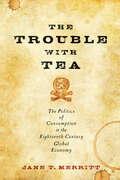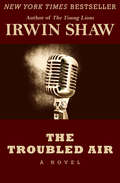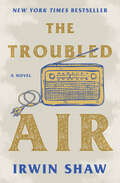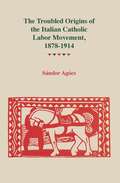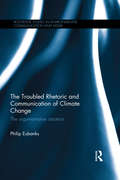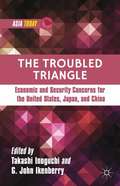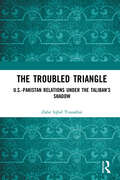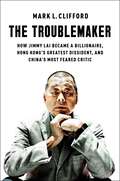- Table View
- List View
The Triumph of Injustice: How The Rich Dodge Taxes And How To Make Them Pay
by Gabriel Zucman Emmanuel SaezAmerica’s runaway inequality has an engine: our unjust tax system. Even as they became fabulously wealthy, the ultra-rich have had their taxes collapse to levels last seen in the 1920s. Meanwhile, working-class Americans have been asked to pay more. The Triumph of Injustice presents a forensic investigation into this dramatic transformation, written by two economists who revolutionized the study of inequality. Eschewing anecdotes and case studies, Emmanuel Saez and Gabriel Zucman offer a comprehensive view of America’s tax system, based on new statistics covering all taxes paid at all levels of government. Their conclusion? For the first time in more than a century, billionaires now pay lower tax rates than their secretaries. Blending history and cutting-edge economic analysis, and writing in lively and jargon-free prose, Saez and Zucman dissect the deliberate choices (and sins of indecision) that have brought us to today: the gradual exemption of capital owners; the surge of a new tax avoidance industry, and the spiral of tax competition among nations. With clarity and concision, they explain how America turned away from the most progressive tax system in history to embrace policies that only serve to compound the wealth of a few. But The Triumph of Injustice is much more than a laser-sharp analysis of one of the great political and intellectual failures of our time. Saez and Zucman propose a visionary, democratic, and practical reinvention of taxes, outlining reforms that can allow tax justice to triumph in today’s globalized world and democracy to prevail over concentrated wealth.
The Triumph of Nancy Reagan
by Karen TumultyThe definitive biography of the fiercely vigilant and politically astute First Lady who shaped one of the most consequential presidencies of the 20th century: Nancy Reagan.The made-in-Hollywood marriage of Ronald and Nancy Reagan is more than a love story—it&’s the partnership that made him president. Of the pair, Nancy was the one with the sharper instincts about people, the superior radar for trouble, and the keen sense of how to secure his place in history. The only person in the world to whom Ronald Reagan felt truly close, Nancy understood how to foster his strengths and compensate for his weaknesses. Neither timid nor apologetic about wielding her power, Nancy Reagan made herself a place in history. But that confidence took years to develop. Nancy&’s traumatic early childhood instilled in her a lifelong anxiety and a craving for security. Born into a broken marriage, she spent seven years yearning for the absent mother who abandoned her to pursue an acting career. When she met Ronnie, who had a difficult upbringing of his own, the two fractured halves became whole. And as Ronnie turned from acting to politics, she did too, helping build the scaffolding of his rise and cultivating the wealthy and powerful figures who would help pave his way. Not only was Nancy crucial in shaping Ronald&’s White House team and in softening her husband&’s rhetoric, she became an unseen force pushing her husband toward what she saw as his grandest purpose—to shake his image as a warmonger and leave behind a more peaceful world. This book explores the multifaceted character of Nancy Reagan and reveals new details surrounding the tumultuous presidency. The Washington Post columnist Karen Tumulty spent four years interviewing the people who knew this couple best and draws on overlooked archives, letters, memoirs, and White House records, compiling the most extensive biography of Nancy Reagan yet. From the AIDS epidemic to tensions with the Soviets and the war on drugs, this book shows how Nancy Reagan became one of the most influential First Ladies of the century.
The Triumph of Politics: Why the Reagan Revolution Failed
by David A. StockmanRegarding Stockman's years in the Reagan Administration.
The Triumph of Politics: Why the Reagan Revolution Failed
by David A. StockmanThe controversial bestseller on the failure of the Reagan Revolution, now back in print
The Triumph of William McKinley: Why the Election of 1896 Still Matters
by Karl RoveFrom New York Times bestselling author and political mastermind Karl Rove comes a fresh look at President William McKinley, whose 1896 campaign ended a bitter period of political gridlock and reformed and modernized his party, thereby creating a governing majority that dominated American politics for the next thirty-six years.<P><P> The 1896 political environment resembles that of today: A rapidly changing electorate affected by a growing immigrant population, an uncertain economy disrupted by new technologies, growing income inequality, and contentious issues the two parties could not resolve. McKinley found ways to address these challenges and win, which is why his campaign is so relevant to our politics now.<P> McKinley, a Civil War hero who preferred “The Major” above any other title he was given, changed the arc of American history by running the first truly modern presidential campaign. Knowing his party could only win if it grew beyond its base, he reached out to diverse ethnic groups, including openly seeking the endorsement of Catholic leaders and advocating for black voting rights. Running on the slogan “The People Against the Bosses,” McKinley also took on the machine men who dominated his own party. He deployed campaign tactics still used today, including targeting voters with the best available technology. Above all, he offered bold, controversial answers to the nation’s most pressing challenge—how to make a new, more global economy work for every American—and although this split his own party, he won the White House by sticking to his principles, defeating a charismatic champion of economic populism, William Jennings Bryan. <P> The 1896 election is a compelling drama in its own right, but McKinley’s strategies offer important lessons for both political parties today.
The Tropical Silk Road: The Future of China in South America
by Paul Amar, Lisa Rofel, María Amelia Viteri, Consuelo Fernández-Salvador, and Fernando BrancoliThis book captures an epochal juncture of two of the world's most transformative processes: the People's Republic of China's rapidly expanding sphere of influence across the global south and the disintegration of the Amazonian, Cerrado, and Andean biomes. The intersection of these two processes took another step in April 2020, when Chinese President Xi Jinping launched a "New Health Silk Road" agenda of aid and investment that would wind through South America, extending the Eurasian-African "Belt and Road Initiative" to a series of mine, port, energy, infrastructure, and agrobusiness megaprojects in the Latin American tropics. Through thirty short essays, this volume brings together an impressive array of contributors, from economists, anthropologists, and political scientists to Black, feminist, and Indigenous community organizers, Chinese stakeholders, environmental activists, and local journalists to offer a pathbreaking analysis of China's presence in South America. As cracks in the progressive legacy of the Pink Tide and the failures of ecocidal right-wing populisms shape new political economies and geopolitical possibilities, this book provides a grassroots-based account of a post-US centered world order, and an accompanying map of the stakes for South America that highlights emerging voices and forms of resistance.
The Trouble With Empire: Challenges To Modern British Imperialism
by Antoinette BurtonThe Trouble with Empire contends that dissent and disruption were constant features of imperial experience and that they should, therefore, drive narratives of the modern British imperial past. Moving across the one hundred years between the first Anglo-Afghan war and Gandhi's salt marches, the book tracks commonalities between different forms of resistance in order to understand how regimes of imperial security worked in practice. This emphasis on protest and struggle is intended not only to reveal indigenous agency but to illuminate the limits of imperial power, official and unofficial, as well. "Pax Britannica"-the conviction that peace was the dominant feature of modern British imperialism-remains the working presumption of most empire histories in the twenty-first century. The Trouble with Empire, in contrast, originates from skepticism about the ability of hegemons to rule unchallenged and about the capacity of imperial rule to finally and fully subdue those who contested it. The book follows various forms of dissent and disruption, both large and small, in three domains: the theater of war, the arena of market relations, and the realm of political order. Tracking how empire did and did not work via those who struggled against it recasts ways of measuring not simply imperial success or failure, but its very viability across the uneven terrain of daily power. The Trouble with Empire argues that empires are never finally or fully accomplished but are always in motion, subject to pressures from below as well as above. In an age of spectacular insurgency and counterinsurgency across many of the former possessions of Britain's global empire, such a genealogy of the forces that troubled imperial hegemony are needed now more than ever.
The Trouble With Normal: Sex, Politics, and the Ethics of Queer Life
by Michael WarnerMichael Warner, one of our most brilliant social critics, argues that gay marriage and other moves toward normalcy are bad not just for gays but for everyone. In place of sexual status quo, Warner offers a vision of true sexual autonomy that will forever change the way we think about sex, shame and identity.
The Trouble With Passion: Political Theory Beyond the Reign of Reason
by Cheryl HallPolitical theorists have long argued that passion has no place in the political realm where reason reigns supreme. But, is this dichotomy between reason and passion sustainable? Does it underestimate the indispensable role of passion in a fully democratic society? Drawing upon Plato, Rousseau, and contemporary feminist theorists, Cheryl Hall argues that passion is an essential component of a just political community and that the need to educate passion together with reason is paramount. Trouble with Passion provides a compelling defense of the crucial place of passion in politics.
The Trouble with City Planning: What New Orleans can Teach Us
by Kristina FordAfter the vast destruction wrought by Hurricane Katrina, New Orleans faces a rare chance to rebuild, with an unprecedented opportunity to plan what gets built. As the city's director of planning from 1992 until 2000, Kristina Ford is uniquely placed to use these opportunities as a springboard for an eye-opening discussion of the intransigent problems and promising possibilities facing city planners across the nation and beyond. InThe Trouble with City Planning,Ford argues that almost no part of our usual understanding of the phrase "city planning" is accurate: not our conception of the plan itself, nor our sense of what city planners do or who plans are made for or how planners determine what citizens want. Most important, our conventional understanding does not tell us how a plan affects what gets built in any city in America. Ford advances several planning innovations that, if adopted, could be crucial for restoring New Orleans, but also transformative wherever citizens are troubled by the results of their city's plan. This keenly intelligent book is destined to become a classic for planners and citizens alike.
The Trouble with Europe
by Roger BootleThe European Union was a brilliant stroke of political and economic engineering when it came into its current form, averting major wars and reducing social tensions among member states. But as Europe moves into the second decade of the twenty-first century, problems are multiplying-problems that arose due to the EU's very existence. In The Trouble with Europe, Roger Bootle, winner of the 2012 Wolfson Economics Prize, tackles the uncomfortable truth that the European Union might be going down-and could take the global economy with it.Bootle expertly outlines the factors that gave birth to the European union of the twentieth century, from the collective Euro-spirit that initiated a solution to the region's various problems and the subsequent unforeseen consequences of the compromises nations made in order to create a sustainable organization. Bootle examines how the euro has hindered independent actions of member nations, both economically and politically, before envisaging how a post-EU Europe might come about and how it would affect the United Kingdom, along with other member states and the world at large. Is a full dissolution the only answer or could the United Kingdom's withdrawal be a viable course of action? With EU elections looming in May 2014, The Trouble with Europe is a compelling read for anyone interested in the economic, political, and social future of the United Kingdom and all of Europe.Roger Bootle is an economist and a weekly columnist for the Daily Telegraph. He is currently the managing director of Capital Economics, an independent macroeconomic research consultancy. Bootle is the author of several books, including The Trouble with Markets and Money for Nothing.
The Trouble with Islam Today: A Muslim's Call for Reform in Her Faith
by Irshad Manji"I have to be honest with you. Islam is on very thin ice with me.... Through our screaming self-pity and our conspicuous silences, we Muslims are conspiring against ourselves. We're in crisis and we're dragging the rest of the world with us. If ever there was a moment for an Islamic reformation, it's now. For the love of God, what are we doing about it?"In this open letter, Irshad Manji unearths the troubling cornerstones of mainstream Islam today: tribal insularity, deep-seated anti-Semitism, and an uncritical acceptance of the Koran as the final, and therefore superior, manifesto of God's will. But her message is ultimately positive. She offers a practical vision of how Islam can undergo a reformation that empowers women, promotes respect for religious minorities, and fosters a competition of ideas. Her vision revives "ijtihad," Islam's lost tradition of independent thinking. In that spirit, Irshad has a refreshing challenge for both Muslims and non-Muslims: Don't silence yourselves. Ask questions---out loud. The Trouble with Islam Today is a clarion call for a fatwa-free future.
The Trouble with Nigeria
by Chinua AchebeThe trouble with Nigeria is simply and squarely a failure of leadership. There is nothing basically wrong with the Nigerian land or climate or water or air or anything else. The Nigerian problem is the unwillingness or inability of its leaders to rise to the responsibility, to the challenge of personal example which are the hallmarks of true leadership.
The Trouble with Reality: A Rumination on Moral Panic in Our Time
by Brooke GladstoneEvery week on the public radio show On the Media, the award-winning journalist Brooke Gladstone analyzes the media and how it shapes our perceptions of the world. Now, from her front-row perch on the day’s events, Gladstone brings her genius for making insightful, unexpected connections to help us understand what she calls—and what so many of us can acknowledge having—“trouble with reality.” Reality, as she shows us, was never what we thought it was—there is always a bubble, people are always subjective and prey to stereotypes. And that makes reality actually more vulnerable than we ever thought. Enter Donald J. Trump and his team of advisors. For them, as she writes, lying is the point. The more blatant the lie, the easier it is to hijack reality and assert power over the truth. Drawing on writers as diverse as Hannah Arendt, Walter Lippmann, Philip K. Dick, and Jonathan Swift, she dissects this strategy, straight out of the authoritarian playbook, and shows how the Trump team mastered it, down to the five types of tweets that Trump uses to distort our notions of what’s real and what’s not. And she offers hope. There is meaningful action, a time-tested treatment for moral panic. And there is also the inevitable reckoning. History tells us we can count on it. Brief and bracing, The Trouble with Reality shows exactly why so many of us didn’t see it coming, and how we can recover both our belief in reality—and our sanity.
The Trouble with Speculation: Natures, Futures, Politics (Global Discourse)
by Christine Mortimer and Maria Alejandra Luján EscalanteBringing together contributors from Europe, North America and Australia, this book questions the purpose and outcomes of speculation in practical settings. In the context of interrelated and complex global challenges, speculation is not just useful but necessary. The chapters in this book present a cross-disciplinary dialogue of people that are developing work in speculation and interrogates its practices and ethical and political charges. Through these discussions, the book explores the potential of speculation in addressing issues such as climate change, urban futures and new political practices.
The Trouble with Tea: The Politics of Consumption in the Eighteenth-Century Global Economy (Studies In Early American Economy And Society From The Library Company Of Philadelphia Ser.)
by Jane T. MerrittHow tea’s political meaning shaped the culture and economy of the Anglo-American world.Americans imagined tea as central to their revolution. After years of colonial boycotts against the commodity, the Sons of Liberty kindled the fire of independence when they dumped tea in the Boston harbor in 1773. To reject tea as a consumer item and symbol of “taxation without representation” was to reject Great Britain as master of the American economy and government. But tea played a longer and far more complicated role in American economic history than the events at Boston suggest.In The Trouble with Tea, historian Jane T. Merritt explores tea as a central component of eighteenth-century global trade and probes its connections to the politics of consumption. Arguing that tea caused trouble over the course of the eighteenth century in several different ways, Merritt traces the multifaceted impact of that luxury item on British imperial policy, colonial politics, and the financial structure of merchant companies. Merritt challenges the assumption among economic historians that consumer demand drove merchants to provide an ever-increasing supply of goods, thus sparking a consumer revolution in the early eighteenth century.The Trouble with Tea reveals a surprising truth: that concerns about the British political economy, coupled with the corporate machinations of the East India Company, brought an abundance of tea to Britain, causing the company to target North America as a potential market for surplus tea. American consumers only slowly habituated themselves to the beverage, aided by clever marketing and the availability of Caribbean sugar. Indeed, the “revolution” in consumer activity that followed came not from a proliferation of goods, but because the meaning of these goods changed. By the 1750s, British subjects at home and in America increasingly purchased and consumed tea on a daily basis; once thought a luxury, tea had become a necessity. This fascinating look at the unpredictable path of a single commodity will change the way readers look at both tea and the emergence of America.“By tackling a commodity we think we already know in its political, economic, and cultural dimensions, Jane T. Merritt demonstrates that the true story of tea is more complex and global than readers might expect. The Trouble with Tea is a surprising and detailed look at how the long-term moral debates over tea overlapped with and offered a vocabulary for the politicized debates of the Revolutionary War era.” —Ellen Hartigan-O’Connor, author of The Ties that Buy: Women and Commerce in Revolutionary America“Long before Bostonians dumped tea overboard, tea was trouble: as trading companies pushed it and consumers sipped it, tea sparked debates over free trade and dangerous luxuries. With her wide-ranging command of global commerce and domestic politics, Merritt tells a vital tale about how tea shaped our world.” —Benjamin L. Carp, author of Defiance of the Patriots: The Boston Tea Party and the Making of America
The Trouble with Tea: The Politics of Consumption in the Eighteenth-Century Global Economy (Studies in Early American Economy and Society from the Library Company of Philadelphia)
by Jane T. MerrittHow tea’s political meaning shaped the culture and economy of the Anglo-American world.Americans imagined tea as central to their revolution. After years of colonial boycotts against the commodity, the Sons of Liberty kindled the fire of independence when they dumped tea in the Boston harbor in 1773. To reject tea as a consumer item and symbol of "taxation without representation" was to reject Great Britain as master of the American economy and government. But tea played a longer and far more complicated role in American economic history than the events at Boston suggest.In The Trouble with Tea, historian Jane T. Merritt explores tea as a central component of eighteenth-century global trade and probes its connections to the politics of consumption. Arguing that tea caused trouble over the course of the eighteenth century in a number of different ways, Merritt traces the multifaceted impact of that luxury item on British imperial policy, colonial politics, and the financial structure of merchant companies. Merritt challenges the assumption among economic historians that consumer demand drove merchants to provide an ever-increasing supply of goods, thus sparking a consumer revolution in the early eighteenth century.The Trouble with Tea reveals a surprising truth: that concerns about the British political economy, coupled with the corporate machinations of the East India Company, brought an abundance of tea to Britain, causing the company to target North America as a potential market for surplus tea. American consumers only slowly habituated themselves to the beverage, aided by clever marketing and the availability of Caribbean sugar. Indeed, the "revolution" in consumer activity that followed came not from a proliferation of goods, but because the meaning of these goods changed. By the 1750s, British subjects at home and in America increasingly purchased and consumed tea on a daily basis; once thought a luxury, tea had become a necessity. This fascinating look at the unpredictable path of a single commodity will change the way readers look at both tea and the emergence of America.
The Trouble with the Congo
by Séverine AutesserreThe Trouble with the Congo suggests a new explanation for international peacebuilding failures in civil wars. Drawing from more than 330 interviews and a year and a half of field research, it develops a case study of the international intervention during the Democratic Republic of the Congo's unsuccessful transition from war to peace and democracy (2003-2006). Grassroots rivalries over land, resources, and political power motivated widespread violence. However, a dominant peacebuilding culture shaped the intervention strategy in a way that precluded action on local conflicts, ultimately dooming the international efforts to end the deadliest conflict since World War II. Most international actors interpreted continued fighting as the consequence of national and regional tensions alone. UN staff and diplomats viewed intervention at the macro levels as their only legitimate responsibility. The dominant culture constructed local peacebuilding as such an unimportant, unfamiliar, and unmanageable task that neither shocking events nor resistance from select individuals could convince international actors to reevaluate their understanding of violence and intervention.
The Troubled Air: A Novel
by Irwin ShawNew York Times Bestseller: A provocative novel about one man&’s struggle with courage and his conscience at the height of McCarthyism. Clement Archer, head of a popular radio show, faces a profound dilemma: Five of his employees stand accused of being communists, and a magazine threatens disclosure unless Archer fires each and every one. Despite his efforts to meet his own moral standards and avoid self-incrimination, Archer finds himself hounded from both ends of the political spectrum for his seemingly righteous actions. The Troubled Air, Irwin Shaw&’s second novel, was published immediately before the author moved to Europe, where he lived for the next twenty-five years. The story remains a powerful portrayal of a good, decent man ensnared by the hysteria and cruelty of a dark period in American history. This ebook features an illustrated biography of Irwin Shaw including rare images and never-before-seen documents from the author&’s estate.
The Troubled Air: A Novel
by Irwin ShawNew York Times Bestseller: A provocative novel about one man&’s struggle with courage and his conscience at the height of McCarthyism. Clement Archer, head of a popular radio show, faces a profound dilemma: Five of his employees stand accused of being communists, and a magazine threatens disclosure unless Archer fires each and every one. Despite his efforts to meet his own moral standards and avoid self-incrimination, Archer finds himself hounded from both ends of the political spectrum for his seemingly righteous actions. The Troubled Air, Irwin Shaw&’s second novel, was published immediately before the author moved to Europe, where he lived for the next twenty-five years. The story remains a powerful portrayal of a good, decent man ensnared by the hysteria and cruelty of a dark period in American history. This ebook features an illustrated biography of Irwin Shaw including rare images and never-before-seen documents from the author&’s estate.
The Troubled Origins of the Italian Catholic Labor Movement, 1878–1914
by Sándor AgócsIn his book, Sándor Agócs explores the conflicts that accompanied the emergence of the Italian Catholic labor movement. He examines the ideologies that were at work and details the organizational forms they inspired. During the formative years of the Italian labor movement, Neo-Thomism became the official ideology of the church. Church leadership drew upon the central Thomistic principal of caritas, Christian love, in its response to the social climate in Italy, which had become increasingly charged with class consciousness and conflict. Aquinas’s principles ruled out class struggle as contrary to the spirit of Christianity and called for a symbiotic relationship among the various social strata. Neo-Thomistic philosophy also emphasized the social functions of property, a principle that demanded the paternalistic care and tutelage of the interests of working people by the wealthy. In applying these principles to the nascent labor movement, the church's leadership called for a mixed union (misto), whose membership would include both capitalists and workers. They argued that this type of union best reflected the tenets of Neo-Thomistic social philosophy. In addition, through its insistence on the misto, the church was also motivated by an obsessive concern with socialism, which it viewed as a threat, and by a fear of the working classes, which it associated with socialism, which it viewed as a threat, and by a fear of the working classes, which it associated with socialism. In pressing for the mixed union, therefore, the church leadership hoped not only to realize Neo-Thomistic principles, but also to defuse class struggle and prevent the proletariat from becoming a viable social and political force. Catholic activists, who were called upon to put ideas into practice and confronted social realities daily, learned that the "mixed" unions were a utopian vision that could not be realized. They knew that the age of paternalism was over and that neither the workers not the capitalists were interested in the mixed union. In its stead, the activists urged for the "simple" union, an organization for workers only. The conflict which ensued pitted the bourgeoisie and the Catholic hierarchy against the young activists. Sándor Agócs reveals precisely in what way Catholic social thought was inadequate to deal with the realities of unionization and why Catholics were unable to present a reasonable alternative.
The Troubled Rhetoric and Communication of Climate Change: The argumentative situation (Routledge Studies in Environmental Communication and Media)
by Philip EubanksDespite an overwhelming scientific consensus, climate change remains one of the most controversial issues of our time. Focusing on the rhetoric that surrounds the issue of climate change, this groundbreaking book analyses why the debate continues to rage and examines how we should argue when winning the argument really matters. Going beyond routine condemnations of the wildest statements made by religious fundamentalists or spokespeople for fossil fuel interests, the book explains the mutually exacerbating problems that permit many of us greet catastrophic predictions with an equivocal shrug. It argues that the argumentative situation around climate change makes a certain kind of skepticism – "fair-minded skepticism" – not only possible but likely. The book also strikes a hopeful note, reminding us that people do change their minds in response to effective argumentation that appeals to deeply shared values. Offering new insight into an ongoing academic discussion about the nature of argument and how it can be undertaken more effectively and ethically, as well as a new perspective on the rhetoric of science and technology, this book will be a valuable resource to students and scholars of climate change, environmental humanities, rhetoric, environmental communication, sociology and science and technology studies.
The Troubled Triangle
by G. John Ikenberry Takashi InoguchiThe US, China, and Japan form a 'troubled triangle,' with each country negotiating its foreign policy toward the other two in response to economic and security pressures that operate as an interrelated duality. Written by international relations experts, this book examines how the three countries respond to this set of pressures and to each other.
The Troubled Triangle: US-Pakistan Relations under the Taliban’s Shadow
by Zafar Iqbal YousafzaiThis book is a comprehensive analysis of the Taliban, and how it has affected post-9/11 U.S.-Pakistan relations. It analyzes the genesis of the Taliban, the rationale behind their emergence and how they consolidated their rule in Afghanistan from 1996 to 2001. It examines the U.S. policies towards the Taliban in the post 9/11 era and Pakistan’s role as an ally in their efforts towards dismantling Taliban rule in Afghanistan—from Obama’s ‘fight and talk’ policy to the Doha peace agreement in 2020. It also discusses the outcomes of the Global War on Terror (GWoT), as well as the Taliban’s response to the U.S.-led ISAF and NATO forces in Afghanistan. The volume brings into focus Pakistan’s policies vis-à-vis the Taliban following the start of GWoT and how it pushed the U.S.-Pakistan relations to its lowest ebb; and then its role in bringing the Taliban to the negotiating table which resulted in the U.S.-Taliban deal in Doha in February 2020. The author introduces a ‘new balance of threat’ theory and expands on its applicability through the Taliban case study. The book will be of great interest to scholars and researchers of U.S. foreign policy, international relations, peace and conflict studies, strategic studies, history, diplomatic studies and South Asian politics.
The Troublemaker: How Jimmy Lai Became a Billionaire, Hong Kong's Greatest Dissident, and China's Most Feared Critic
by Mark L. CliffordThe astonishing story of the billionaire businessman Jimmy Lai who became one of Hong Kong&’s leading activists for democracy and is today China&’s most famous political prisoner.Jimmy Lai escaped mainland China when he was twelve years old, at the height of a famine that killed tens of millions. In Hong Kong, he hustled; no work was beneath him, and he often slept on a table in a clothing factory where he did odd jobs. At twenty-one, he was running a factory. By his mid-twenties, he owned one and was supplying sweaters and shirts to some of the biggest brands in the United States, from Polo to The Limited. His ideas about retail led him to create Giordano in 1981, and with it &“fast fashion.&” A restless entrepreneur, as Giordano prepared to go public, he was thinking about a dining concept that would disrupt Hong Kong&’s fast-food industry. But then came the Tiananmen Square democracy protest and the massacre of 1989. His reaction to the violence was to enter the media business to push China toward more freedoms. He started a magazine, Next, to advocate for democracy in Hong Kong. Then, just two years before the city was to return to Chinese control, he founded the Apple Daily newspaper. Its mix of bold graphics, gossip, local news, and opposition to the Chinese Communist Party was an immediate hit. For more than two decades, Lai used Apple and Next as part of a personal push for democracy—in weekly columns, at rallies and marches, and, memorably, sitting in front of a tent during the 2014 Occupy Central movement. Lai took his activism abroad, traveling frequently to Washington, where he was well known in Congress and in political circles. China reacted with fury in 2019 when he met with Vice President Mike Pence and Secretary of State Mike Pompeo. A draconian new security law came into effect in Hong Kong in mid-2020, effectively making free speech a crime and censorship a fact. Lai was its most important target. Apple Daily was raided on August 10, 2020. He was arrested and held without bail before being convicted of trumped-up charges ranging from lighting a candle (&“incitement to riot&”) to violating a clause in his company&’s lease (&“fraud&”). At the end of 2023, a lengthy trial began alleging &“collusion with foreign forces&” and printing seditious materials. China&’s most famous political prisoner has been in jail for more than 1,100 days and could spend the rest of his life there. The Troublemaker is his story.
